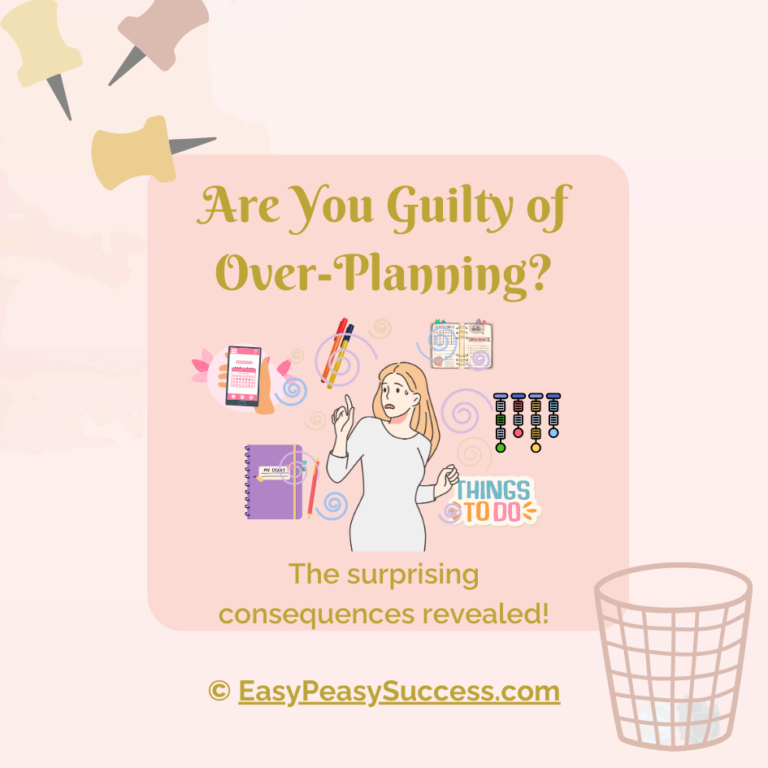Are you guilty of over-planning? It’s a strange question, coming from two people who love planning, but stay with us. Over-planning leads to surprising consequences, and we’re here to reveal just what they are.
The Dark Side Of Over-Planning: It’s Secretly Sabotaging Your Success
In a world that praises meticulous planning, it may seem counter-intuitive to suggest that over-planning could be a problem. But if you’re feeling overwhelmed, and perhaps using too many planning methods at once, this article may just help.
Are you using several planning methods – physical planner, online calendar, Trello, phone reminders, to-do lists, printed calendar, etc – at the same time? This could be causing you considerable stress without you even realising it.
But Isn’t Planning The Key To Achieving Our Goals And Making Our Dreams A Reality?
Yes and no. While planning is essential, there’s a dark side to it that you may not have heard about. We’re going to explore the consequences of over-planning, and show how it can sabotage your success.
The Myth of Perfect Planning
To understand the issue with over-planning, we need to debunk the myth of perfect planning. We may have been conditioned to believe that if we plan every minute detail, we’ll avoid mistakes and ensure success, but this couldn’t be further from the truth.
Perfection Is An Illusion
You can plan all you like, but life is unpredictable. There are way too many variables beyond our control, so trying to account for all of them is futile – and impossible.
Paralysis By Analysis
Spending too much time planning can lead to what’s known as ‘analysis paralysis’. This is when you become so consumed by planning, and seeking the perfect solution, that you never take action. You’re stuck in a perpetual state of getting ready to get ready, but you never actually move forward.
The Opportunity Cost of Over-Planning
What do we mean by opportunity cost? Well, when we spend excessive time planning, we can miss out on opportunities. We’ve probably all experienced this at some point in our lives, whether that’s from procrastinating or spending too long thinking, rather than actually doing.
If we’re too busy planning for the future, and not living in the present, opportunities can pass us by. Success requires seizing the right opportunity at the right time. Over-plan, and we can miss these moments.
Time Wasted
Over-planning often means spending too long on the minor details. Time that could be better spent taking action, learning from our mistakes, and adapting to changing circumstances. By all means break your big goals down into smaller steps, but as the famous book says, ‘don’t sweat the small stuff‘. (Gill highly recommends reading this book: it could be life-changing for you, as it was for her.)
The Fear Of Imperfection & The Pursuit Of Perfection
We may be scared of imperfection because we’re driven by a desire to eliminate all possible mistakes, so we compensate by over-planning. This can be counter-productive.
Over-planners often fall into the trap of perfectionism: they believe everything must be flawless. But this mindset can lead to dissatisfaction, anxiety, and even depression.
Inflexibility And Adaptability
Over-planners may also struggle to adapt to unexpected changes. This is because they’ve rigidly planned for a specific outcome, and when things don’t go as planned, they experience stress and frustration.
Success often comes from being adaptable, because we’re always evolving and need to change. For example, if we’re sailing, the ability to adjust our course is essential. Over-planning can hinder how adaptable/flexible we are.
Resistance To Change And Lack Of Resilience
Over-planners can also resist change because it disrupts their meticulously laid-out plans. This can be a significant obstacle to growth and progress. It can also mean we struggle to bounce back when we encounter setbacks.
Balancing Planning And Action
So how do we avoid the pitfalls of over-planning, whilst still harnessing the power of effective planning? It’s all about finding the right balance.
- Start by setting clear and achievable goals. Understand what you want to accomplish and why it matters to you. Having a well-defined purpose will guide your planning efforts.
- While planning is crucial, it should not be a substitute for action, so don’t get caught up in endless planning cycles. Take that first step, even if your plan isn’t perfect.
- Recognise that plans may need to change as circumstances evolve, and try to embrace change. Be open to revising your plans when required, and see this as an opportunity for growth.
- Rather than fearing mistakes, think of them as valuable learning experiences. Failure can help us make better decisions going forward.
- Work on improving your adaptability. Practice being flexible in your thinking, and open to new possibilities. Embrace change as a natural part of your journey.
Planning isn’t necessarily the same as being organised: read about an easier way to get organised, here.
To Summarise
While planning is an essential tool for achieving success, over-planning can prevent us from reaching our full potential. Pursuing perfection can lead to missed opportunities. We need to strike a balance between planning and action.
Success is not about creating the perfect plan: it’s about taking consistent, purposeful action, and adapting along the way.
Are you guilty of over-planning? Is it time to embrace a more balanced approach to achieving your goals?
